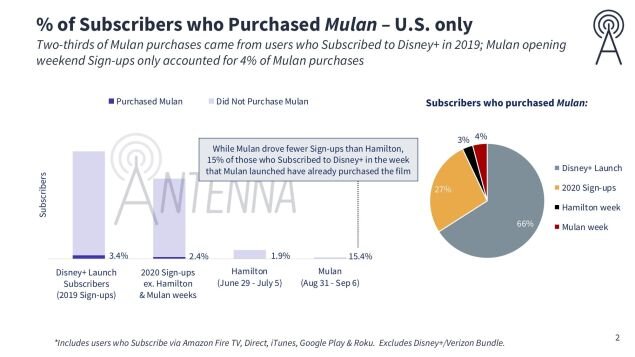Disney’s most recent live-action endeavour, “Mulan,” has been met with mixed emotions since its announcement. A “Mulan” without music or Eddie Murphy was not a “Mulan” that most wanted to see.
“When I heard that it was basically gonna be a spin on feminism, I was not excited. Plus the trailer was just weird; it’s just her with a sword the whole time,” said Hannah Urban ’22. She also said that she has not seen the movie and does not plan to.
The idea of paying $30 on top of a Disney+ subscription intimidated people from even considering watching the new movie. Even internationally, the movie was not received with excitement, as China’s movie industry has droves of movies about warrior princesses set in times long past. Of course, as more facts about the movie came to light, the estimated gross of “Mulan” - $261 million in 12 days according to Yahoo - became more and more of a pipe dream.
Even before the movie’s release, #BoycottMulan was trending. Why? Lead actress Liu Yifei’s and well-known actor Donnie Yen’s support of the Hong Kong law enforcement over pro-democracy protesters came to light last September.
After the movie was released, #BoycottMulan started trending again because of what was written in the credits: a thank you to the Chinese government for letting Disney film in Xinjiang, a western province in China. Although at first this may not seem problematic, Xinjiang is actually the location of several concentration camps imprisoning over 2 million Uighur Muslims. This practice has been going on for the last three years. Parts of “Mulan” were filmed in Xinjiang only two years ago, and there is no way Disney did not know about what was happening there, as this was well after the rest of the world and media were abuzz with news of Beijing’s plan to indoctrinate the Uighurs into their Communist Party ideology.
This is not only shocking but also disgusting to many who have loved Disney. Even before the detention camps were built, China has been oppressing and torturing the Uighur minority, specifically in the Xinjiang region, subjecting them to unspeakable horrors like forced sterilization, sexual abuse, family separation and brainwashing.
To add insult to injury, the credits specifically praised and thanked the police security bureau in Turpan, a city in eastern Xinjiang with a large Uighur population. This bureau is tasked with managing internment camps and was blacklisted last year by the U.S. Commerce Department.
Steering away from the politics of it all, Disney’s newest film adds nothing to the story of Mulan. Feeding into the nationalist mythology of Han supremacism—the idea that all parts of China should be governed and dominated by ethnic Han Chinese—the movie promotes a messy “fairytale China” in addition to the Islamophobia presented by having the villains be heavily Middle Eastern coded. Okay, so we’re not actually steering away from politics.
Author Jeannette Ng writes, “The film was put together by a team of Western scriptwriters who seem to have done very little homework, resulting in a jumbled mess whose absorption of China’s nationalist myths is largely unconscious... It isn’t that historical inaccuracy or deviation from established wuxia tropes is paramount so much as that this doesn’t feel like a knowing subversion or a stylistic choice motivated by a strong artistic vision; it just feels incompetent.”
Ng goes on to say that the different settings within the movie like Mulan’s childhood home and the imperial city have vastly different aesthetics and appear to be from two entirely different cultures, not something that fits well into the movie.
Even the story of Mulan was lost in this unfortunate retelling that so many were awaiting and so many are now disappointed in. There are, of course, ways other than the animated Disney version of “Mulan” to retell and interpret the poem and story of the warrior woman, but working through the list of supposed wrongs taken from mainland China’s disdain for said animated film is not a good way to go about it.
In this new take, Mulan loses all sense of self-discovery to an all-consuming devotion to her family. This isn’t to say that familial devotion is bad, but there is a lack of growth especially compared to the animated movie as told in the song and movie sequence “I’ll Make a Man Out of You.” There is no transgression of gender norms; Mulan is no longer someone who grapples with her gender identity and the expectations of femininity. She’s just a woman temporarily pretending to be a man. The film merely defaults to a series of clichés the screenwriters thought would best represent Chinese culture: duty, filial piety, magic, and dramatic fight scenes.
As disappointing as it is disgusting, Disney’s 2020 “Mulan” seems to arrive at the most depressing and narrow version of the original story possible: “service to the emperor will absolve you of all your deviant faults.”


